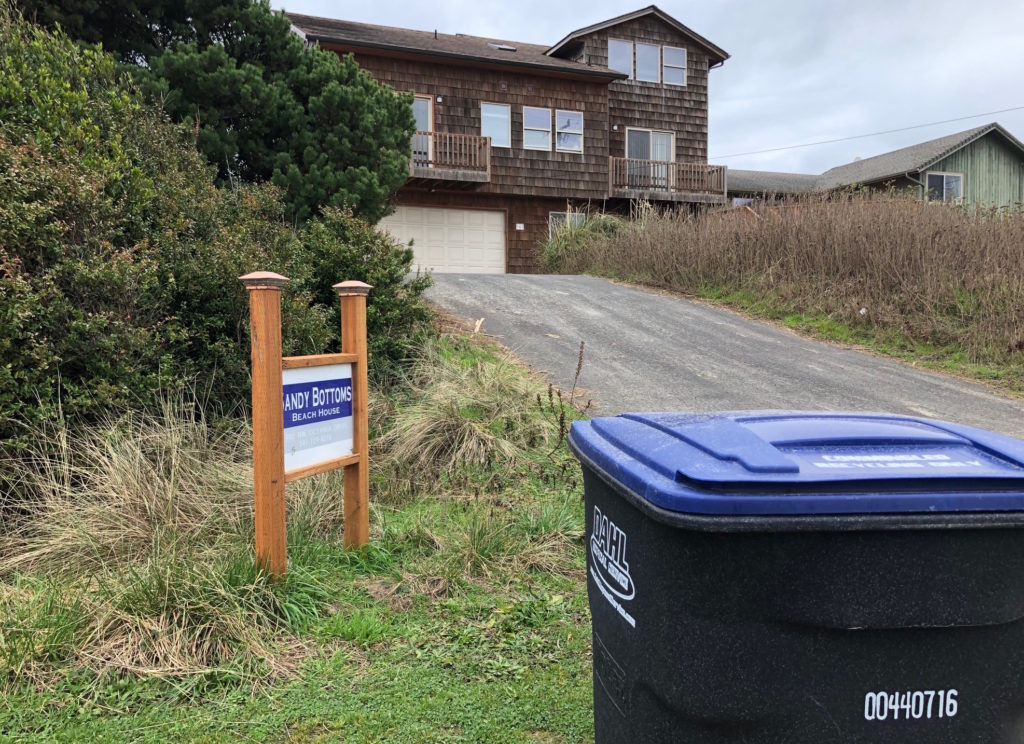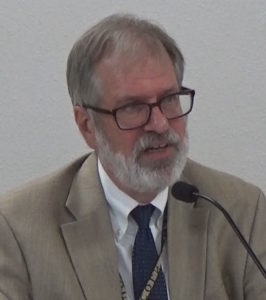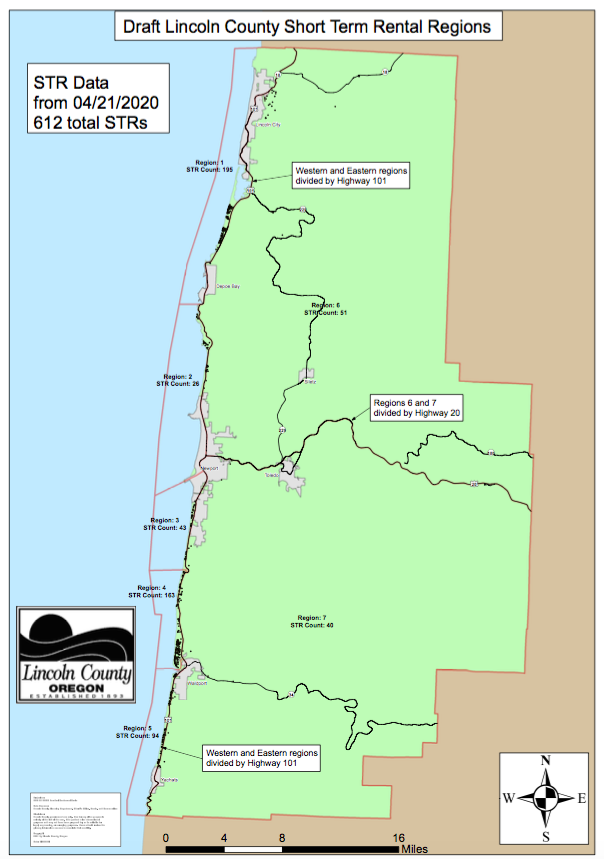
By QUINTON SMITH/YachatsNews.com
Lincoln County appears headed to new, tighter restrictions on vacation rentals in unincorporated areas.
County commissioners Monday agreed – without much discussion, yet – to have County Counsel Wayne Belmont proceed with developing specific wording on proposed regulations for a license cap, occupancy limits, septic inspections, and enforcement.
Commissioners are trying to meet a self-imposed deadline of June 1 to finish what has turned into a nearly two-year process to develop regulations to better control many aspects of short-term rentals in unincorporated Lincoln County. But there were indications Monday that more staff work, holding another public hearing, commissions’ final decisions, and changing the current ordinance would continue into the summer.
Until a moratorium on new licenses was enacted a year ago, the process had been pushed by a burgeoning number of short-term rentals in unincorporated areas after most cities put tighter restrictions on them the past 2-3 years. There are now 585 licensed rentals in unincorporated areas, many concentrated in popular beachside subdivisions overlooking the Pacific Ocean.
The debate – and workshops this year and last – has also resulted in the formation of a group which wants to keep short-term rentals out of single-family neighborhoods and a rental organization which formed to stress the importance of the practice to the coastal economy and to protect owner investments.

On Monday, Belmont walked the three commissioners through four areas of new or changed regulations, asking them individually if county staff should proceed, change or drop the idea.
“What I’m looking for is ‘Yes, this is something we want to do …’ to see if we can move this forward,” Belmont said.
With only a few caveats, commissioners said “Yes.”

Change in occupancy limits?
Here are the proposals and commissioner reaction.
A cap on licenses: County staff is proposing some sort of limit on the number of licenses – but has not said or received direction whether it will be at the current 585 number or something larger or smaller. More recently, staff proposed breaking the county into seven zones, and putting caps in individual areas – possibly with an overall number for the whole county.
All three commissioners – Kaety Jacobson, Doug Hunt and Claire Hall – indicated they liked the idea of area caps.
“I’m more interested in an area hard cap rather than an overall number,” Jacobson said.
Hunt said he wanted to see area caps based on a percentage of short-term rentals in neighborhoods “not necessarily a number.” “But the number needs to go down, not up,” he said.
Hall agreed, adding that the No. 1 driver of her thinking was the “quality of life in residential neighborhoods.”
Occupancy limits: Lincoln County currently has one of the most lenient short-term rental occupancy limits in Oregon – three people per sleeping area and two additional guests. County staff has changed its proposal since Belmont’s last public memo in late March. Staff had been proposing an occupancy limit of two people per sleeping area and no additional guests. On Monday, Belmont suggested a limit of two people per bedroom and “possibly an additional two people.” That means, for example, a three-bedroom rental which currently has a limit of 11 guests would be limited to eight, under the latest proposal.
“There’s probably no single change that will make such a difference in neighborhoods …” Belmont told commissioners.
Commissioners agreed, saying most complaints come from neighbors objecting to large groups of renters, parking and garbage. Belmont said the county would still need to decide on eight “grandfathered” rentals allowed to have more than the current maximum of 16 guests because they have sufficient off-street parking.
Code enforcement: This is the area that needs the most work. County staff and the sheriff’s office, which currently handles enforcement, are proposing an administrative hearings officer to handle complaints and establishing a “three strikes” program to pull licenses of chronic offenders.
Commissioners supported the idea, but said complaint reporting is inconsistent, a “strike” needs to be clearly defined, and the county needs to develop a hearings framework and standards of evidence.
Septic systems: County staff is proposing an initial check of septic systems on short-term rentals and then some type of regular re-check after that. The initial check would also serve to put a limit on the number of rental guests.
Opponents of tighter regulations have criticized the septic proposal, arguing that if short-term rentals are required to have yearly inspections, then so should all septic systems in the county.
Belmont said the average occupancy limit in the county’s rental license database was 8.3 people, while the Census says the average Lincoln County household has 2.5 people.
Brian Crawford of the county planning department told commissioners that their records indicate that septic systems on short-term rentals have a 50 percent higher failure rate than regular households. The most critical element, Crawford said, were “surges” when the rental is used off-and-on by large groups.
“The facts are clear,” Crawford said “… vacation rentals for all types of reasons put a strain on the system.”
Hall said commissioners had received “hundreds” of emails, letters and calls from short-term rental owners objecting to being treated differently on this issue than other homeowners on septic systems. “… this is pretty persuasive data that this approach is justified,” she said.
Commissioners agreed with the approach, but asked staff to be sure to craft a rule that can be implemented and a recommendation for follow up inspections after the initial one.
Commissioners questioned Belmont if the new regulations – and more discussion by them and the public – could be finished by their June 1 deadline. Belmont said he thought the process could be finished this month, but that the pressure to hit the deadline – and lift the current license moratorium — was less if commissioners were in favor of a license cap.
Belmont also said there would need to be another public hearing on the proposals. On Tuesday, the county indicated on its short-term rental website that the hearing would be in June.


